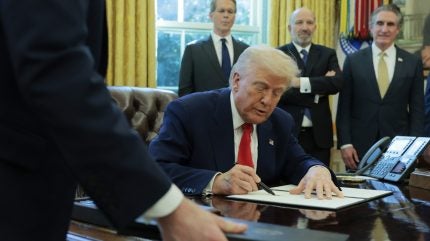
US President Donald Trump has issued a broad executive order to lower prescription drug prices in the country, notably including a directive to ease price negotiation for small molecule drugs.
The 15 April executive order was said by Trump to address the “administratively complex and expensive regime” of the Inflation Reduction Act (IRA), which has he said, “produced much lower savings than projected”. The order directs US Secretary for Health and Human Services (HHS) Robert F. Kennedy Jr. to provide the President with guidance on reform to the Medicare Drug Price Negotiation Program, along with numerous other measures in the next year.

Discover B2B Marketing That Performs
Combine business intelligence and editorial excellence to reach engaged professionals across 36 leading media platforms.
Amidst these directives is a call for the HHS Secretary to work with Congress specifically to modify the programme to align the treatment of small molecule drugs with that of biologics. Addressing the so-called “pill penalty”, the move has the potential to maintain a prolonged higher process for small molecule drugs.
Under the IRA, Medicare may negotiate small molecule drug prices nine years after FDA approval versus 13 years after an approval for biologics. This significantly dissuades developers from investing in cheaper and more broadly indicated small molecule drugs, according to John Stanford, executive director of the pharma advocacy group Incubate.
Critics therefore argue that aligning negotiation periods is needed to support innovation in small molecule development. A longer price negotiation timeline for small molecules would in turn afford pharmaceutical developers greater periods to generate profits before price limits are mandated, reflected in pressure on government to alleviate the pill penalty from industry lobbyists.
The latest executive order also called for a reduction in Medicare Part D premiums in an effort to help access to affordable insulin and epinephrine for low-income patients, and streamline the Importation Program to better allow US states to import drugs from Canada.

US Tariffs are shifting - will you react or anticipate?
Don’t let policy changes catch you off guard. Stay proactive with real-time data and expert analysis.
By GlobalDataDespite sweeping staff cuts seen in recent weeks at the US Food and Drug Administration (FDA), President Trump called for drug approvals to be accelerated. The order also directs US Secretary for Labor, Lori Chavez-DeRemer, to propose regulations to boost transparency in dealings between employer health plans and pharmacy benefit managers (PBMs). PBMs have come under fire in a series of Congressional hearings investigating their alleged role in inflating drug prices as industry middlemen. The dealings in question involve fees paid by PBMs to brokers, encouraging health plans to contract their services.




